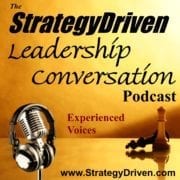The Big Picture of Business – Avoid the Tired, Trite Terms: Encourage Original Thought, Focus on Priorities and Strategy
Words count. Put together, they reflect corporate culture. Used out of context, words become excuses, gibberish, rationales and basically wastes of energy.
When people hear certain words and expressions often enough, they parrot them. Rather than use critical thinking to communicate, many people often gravitate to the same old tired catch phrases.
I sat in a meeting of highly educated business executives. The presenter was dropping the term ‘brand’ into every other sentence. The word had lost its power and came across as a fill-in-the-blank substitution for a more appropriate though. Many people used to do the same thing with the word ‘technology,’ using it far from its reasonable definitions.
These clichés do not belong in business dialog, in strategic planning and in corporate strategy. These expressions are trite and reflect a copy-cat way of talking and thinking:
- ‘Solutions’ is a tired 1990’s term, taken from technology hype. People who use it are vendors, selling what they have to solve your ‘problems,’ rather than diagnosing and providing what your company needs. It is a misnomer to think that a quick fix pawned off as a ‘solution’ will take care of a problem once and for all. Such a word does not belong in conversation and business strategy, let alone the name of the company.
- The ‘brand’ is a marketing term. The strategy, culture and vision are many times greater and more important.
- ‘So…’ In the 1960’s, TV sitcom writers began every scene with ‘So…’ After enough years of hearing it, people lapse that dialog into corporate conversations. It is intended to reduce the common denominator of the discussion to that of the questioner. It is monotonous, and there are more creative ways to engage others into conversation aside from minimizing the dialog.
- ‘Value proposition’ is a sales term and is one-sided toward the person offering it. It implies that the other side must buy in without question.
- ‘Right now’ is a vendor term for what they’re peddling, rather than what the marketplace really needs. Expect to render good business all the time.
- ‘Customer care’ means that customer service is palmed off on some call center. “Customer experience” comes right out of marketing surveys, which rarely ask for real feedback or share the findings with company decision makers. That is so wrong, as customer service must be every business person’s responsibility. Service should not be something that is sold but which nurtures client relationships.
Many of these stock phrases represent ‘copywriting’ by people who don’t know about corporate vision. Their words overstate, get into the media and are accepted by audiences as fact. Companies put too much of their public persona in the hands of marketers and should examine more closely the partial images which they put into the cyberspace. Our culture hears and believes the hype, without looking beyond the obvious.
Here are some examples of the misleading and misrepresenting things one sees and hears in the Information Age. These terms are judgmental and should not be used in marketing, least of all in business strategy: Easy, Better, Best, For all your needs, Perfection, Number one, Good to go, Results, World class, Hearts and minds, Cool, The end of the day, Virtual, Right now, Not so much and Game changing.
Street talk, misleading slogans and terms taken out of context do not belong in the business vocabulary. Business planning requires insightful thinking and language which clearly delineates what the company mission is and how it will grow.
These are the characteristics of effective words, phrases and, thus, company philosophy:
- Focus upon the customer.
- Honor the employees.
- Defines business as a process, not a quick fix.
- Portray their company as a contributor, not a savior.
- Clearly defines their niche.
- Say things that inspire you to think.
- Compatible with other communications.
- Remain consistent with their products, services and track record.
About the Author

Hank’s latest book functions as a ‘PDR of business,’ a view of Big Picture strategies, methodologies and recommendations. This is a creative way of re-treading old knowledge to enable executives to master change rather than feel as they’re victims of it.
Power Stars to Light the Business Flame is now out in all three e-book formats: iTunes, Kindle, and Nook.












Leave a Reply
Want to join the discussion?Feel free to contribute!